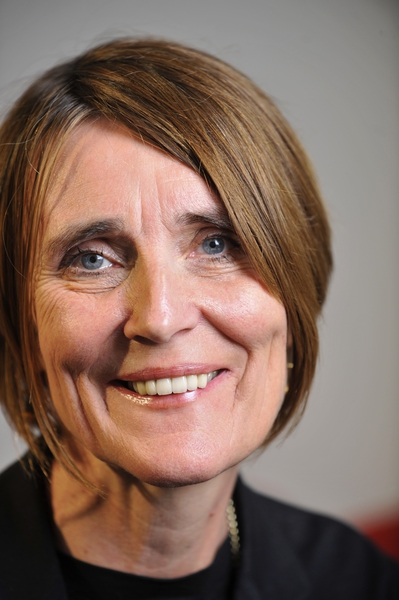You are viewing 1 of your 1 free articles
Agent for change
The first 100 days in the job are any new executive’s most crucial. So how does Dame Clare Tickell plan to make her mark at Hanover? Lydia Stockdale finds out
When we meet Dame Clare Tickell, the new chief executive of Hanover has been in her job for just 15 days. By her calculation, that means she has 85 left to settle in.
‘Management speak says you’ve got 100 days,’ she explains. ‘There’s an expectation after that, you’ll be able to provide some sense of direction.’
Dame Clare, previously chief executive of the charity Action for Children, clearly isn’t someone who has ever lacked a sense of where she’s heading. For a start, she picked up her title in the Queen’s 2010 New Year’s Honours List. It was awarded for her services to young people - recognition of her passion and commitment to working on issues such as child neglect.
Taking the helm
Then , instead of resting on her laurels, on 2 January this year, she started working with those at the opposite end of the age spectrum, taking over from Bruce Moore at the helm of Hanover, a 19,000-home housing provider for the over-55s.
Her office in Staines, west London, which overlooks a swollen River Thames, is sparse and functional. Dame Clare, who is 55 herself, has not yet had the chance to stamp her considerable personality on her surroundings or her 900 new colleagues.
A statuesque and rather imposing figure, she doesn’t need to try very hard to make her presence known, but she’s in no rush to get too comfortable too soon.
‘There’s a small, precious window when you get to ask the really straightforward questions,’ she says with a smile. ‘People assume very quickly you know what you’re talking about.’
Dame Clare has first-hand experience of this. She’s been in this same position several times before: when she took the top job at Action for Children in 2004; in 1997, when she became chief executive of Stonham Housing Association, now the care and support arm of 55,000-home Home Group; and in 1992, when she started as chief executive of Phoenix House Housing Association, now Phoenix Futures, an organisation that works with young people with drug and alcohol problems.
When asked why she decided to make the move to Hanover, she simply says that ‘someone rang me up and it just kind of clicked’.
But this is a woman who doesn’t enter into anything without rigorous examination.
Over the past couple of years, she’s been chair of the charity Help the Hospices’ commission into the future of hospice care. ‘That introduced me to some of the important policy issues around older people,’ she explains.
As well as her own investigation into older people’s housing, the work produced by her new organisation during the Hanover@50 debate, which involved it publishing research documents on housing and ageing by nine think tanks between April and June last year, also drew her in.
‘They were a big pull,’ she says. ‘They were just so interesting.’
England’s population of 64 to 84-year-olds is expected to increase by 39 per cent between 2012 and 2032, according to future trends analysis by healthcare charity the King’s Fund, which uses 2001 and 2011 census information to make predictions. The number of over-85s, meanwhile, is set to rise by 106 per cent over the same period.
What can we expect Dame Clare to bring to the increasingly important older people’s housing sector?
Her cousin, consultant James Tickell, is a director at Campbell Tickell. He lists her ‘laser intelligence’ and ‘burning commitment to social justice’ among her attributes.
In 2008, Third Sector magazine readers voted Dame Clare as their ‘most admired chief executive’.

Source: Vicky Matthers / Iconphotomedia
Mr Tickell believes she will make an equally strong impression on housing. ‘The demands of leadership are the same, whether it’s about young people, substance users, homelessness or older people,’ he says.
Even when she was at Action for Children, one of the UK’s most well-established charities supporting vulnerable children, Dame Clare kept up to date with the housing sector. She has sat on the board of 60,000-home housing association Guinness Partnership for the past three years.
‘Clare was never really away from housing,’ says Mr Tickell. Nevertheless, he adds: ‘I’m really pleased she’s back in our corner.’
Career path
As our interview progresses, Dame Clare becomes increasingly animated and enthusiastic.
‘I did social work at university, but did a great long placement at Shelter and discovered housing that way,’ she says, charting her career history.
‘Everywhere I’ve worked, even in my last job, it has been a truth that if people don’t have good quality housing other aspects of their lives suffer.’
Shortly after the coalition government came into power in 2010, Sarah Teather MP, then minister of state for children and families, commissioned Dame Clare to chair an influential independent report into the early years of children’s lives.
Later, she was outspoken about the impact welfare reform would have on vulnerable children. It is clear she will be just as vocal about the impact of welfare reform on older people. Although they have, to some extent, been protected from the government’s welfare changes, many Hanover residents are anxious about what the future holds for them, says Dame Clare.
‘They’re aware of the economic context in which we’re living,’ she explains. ‘They read the papers and they see that a large proportion of the welfare bill is spent on older people and those with disabilities.’
Dame Clare would like more information about the direction in which welfare reform is heading. Will there be more cuts and, if so, what impact will they have on Hanover residents who are worried about how they would cope with less money?
‘There’s a basic thing about getting some clarity about what the future looks like, not just over the next 12 months or so, but what does welfare reform mean for older people [in the longer term]?’ she says.
Given that there is a general election coming up in 2015, ‘it would be really helpful for political parties to include in their manifestos some clarity’, she argues. ‘What we don’t want is older people not making choices because actually, they don’t feel able to because there’s uncertainty.’
‘We all know that people are living for much longer and leading much more active lives. There are a whole set of complexities [around that], so let’s properly have those conversations. What does well-being mean? How do we engage older people?’
Dame Clare has come back to a housing sector that has changed dramatically in the past decade. ‘It’s much more complex than it was,’ she says. ‘When I started in housing back in the day, it was very straightforward. We got grant money, we got a lot of grant. That’s so different now, not only because grant levels are much lower, but also because private sector builders and developers can bid for what small amounts of grant there are.’
Commercial thinking
At Action for Children, she got used to thinking commercially. Although the majority of the charity’s income came through local authority contracts, ‘an incredibly significant minority came from independent fund raising’, she explains.
‘The advantage of having worked in supported housing [at Stonham] was that it had a set of quite complex relationships with the Probation Service and so on. So actually, it had to be more commercial,’ she adds.
Sir Stephen Bubb, chief executive of the Association of Chief Executives of Voluntary Organisations, describes Dame Clare as being ‘very rooted in social purpose’. He adds that she combines this with having a ‘very strong chief executive background’.
He believes she has commercial acumen, but has not lost sight of why she’s doing the job. ‘Some social housing organisations have become too business-like, they try to play down their social purpose, which is ludicrous,’ he says.
‘How you are contributing to people’s quality of life, particularly people who are vulnerable - whether that’s because they’re poor, young or old - is really important for me,’ explains Dame Clare. ‘It’s why I do what I do.’
But that doesn’t mean she has any answers for Hanover in particular and for the problem of providing enough housing for older people in general. Yet.
Fifteen days into a new job, ‘you don’t know enough to know what you don’t know’, she admits.
Dame Clare certainly knows better than to rush in with hasty solutions, but no doubt ideas are bubbling away under the surface.
‘Is this a new challenge for me personally? Yeah. Totally,’ she says with a laugh. ‘Am I up for it? Totally.’
Around the houses
For three years, Dame Clare Tickell has sat on the board of Guinness Partnership, and is due to stand down at the end of the financial year.
‘It’s been really helpful,’ she says. ‘It’s helped me to understand how different the housing sector is now to when I was working at Stonham [Housing Association].’
Throughout her career, Dame Clare has taken numerous non-executive and advisory roles at organisations ranging from Praxis, which supports refugees and migrants, to the Howard League for Penal Reform. For six years, she was on the board of the Information Commission.
When fulfilling such positions ‘there’s always lots of relevance to your substantive job’, she says.
‘I find that very stimulating intellectually.’
At the moment, Dame Clare chairs the community, voluntary and local services honours committee, awarding MBEs, CBEs, OBEs and other honours to people working in various sectors including housing. She also sits on the main committee that makes the final recommendations as to who should receive an honour from the Queen.
Dame Clare has two sons, aged 23 and 25. ‘My kids are grown up now. Looking back earlier on in my career, that’s when those work/life balance [issues] were bigger.
‘I think I’m probably a bit of a workaholic in a sense.
I think probably my partner would say that, but not in a bad way. I just like to be doing a lot, not just sitting twiddling my thumbs.
‘I like to have different things [going on], I like cross-fertilisation.’








